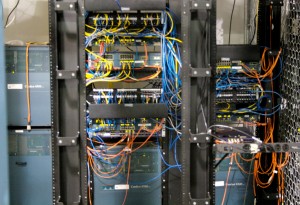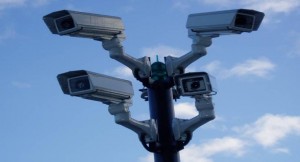
Civil Liberties and Technology: Danger or Defense?
Surveillance technology has been a boon to the security state, and a huge concern for civil liberties watchers. But the ACLU hopes to turn the tide with a new initiative using technology in defense of civil liberty & Constitutional freedoms.
Seemingly daily breakthroughs in computer technology have done much for social networking, entrepreneurship and civic innovation, but they have also stretched the boundaries of permissible conduct of law enforcement in tracking, securing and prosecuting alleged perpetrators.
 Electronic tracking and data-mining make it easier to create matrices and databases that use algorithms to identify targets. The Department of Defense’s 1033 program – which provides surplus military equipment to state and local law enforcement – continues to grow its budget. Coupled with the Department of Homeland Security’s anti-terrorism grants, state and local law enforcement are provided ample funds to be used for surveillance technology and military weapons, including unmanned aerial vehicles, commonly known as drones.
Electronic tracking and data-mining make it easier to create matrices and databases that use algorithms to identify targets. The Department of Defense’s 1033 program – which provides surplus military equipment to state and local law enforcement – continues to grow its budget. Coupled with the Department of Homeland Security’s anti-terrorism grants, state and local law enforcement are provided ample funds to be used for surveillance technology and military weapons, including unmanned aerial vehicles, commonly known as drones.
Much of the technology is new and highly complex. It’s also fodder for police and prosecutors to push the limits of warrantless searches. In Massachusetts, Chapter 272 Section 99 of the General Laws gives law enforcement broad powers to use electronic surveillance. The right to intercept data obtained through electronic surveillance also extends to communications carriers – yes, your phone company – and financial institutions, who are explicitly permitted to share the contents of any wire or oral communication obtained through electronic monitoring when giving testimony in any criminal proceeding.
Recently, the state has also proposed a new law aimed at expanding law enforcement’s wire-tapping powers. Federal and state trends point to further expansion of electronic surveillance, and the legislative framework places few limits on the use of such information in criminal prosecution. Combined with technological breakthroughs in the field, the setting is ripe for the tech train to roll around the fourth amendment by giving police greater-than-ever capability to violate a suspect’s right to due process.
But is there a flip-side? Can technology also be used to protect those very same due process rights and curtail police abuse?
Can Technology Be Used To Protect Individuals From Due Process Violation?
A growing number of civil liberty advocates in the fields of computer and biotechnology seem to think so. Yesterday, the ACLU of Massachusetts announced its Technology for Liberty & Justice for All initiative. Backed by local industry leaders, the multi-million dollar campaign hopes to model the ways in which evolving technologies can be used to protect against abuses of law enforcement rather than a tool to make such violations more seamless. The project aims to to use a new coalition – business leaders, lawyers, academics – to form a powerful constituency to protect the rights of victims subject to rampant, undeserved and legally questionable law enforcement surveillance.
 According to the ACLU’s press release, the project’s goals are divided two-fold. The Technology for Liberty aspect will focus on heightening transparency for government use of surveillance technology, while establishing extensive warrant requirements for its use. Justice for All will focus on pushing these protections with particular focus to issues of racial justice and human rights of immigrants.
According to the ACLU’s press release, the project’s goals are divided two-fold. The Technology for Liberty aspect will focus on heightening transparency for government use of surveillance technology, while establishing extensive warrant requirements for its use. Justice for All will focus on pushing these protections with particular focus to issues of racial justice and human rights of immigrants.
The project is bold and ambitious, and may chart a course of understanding the full scope of new technologies: what they do, how they can help police agencies, and how warrant procedures can be adjusted to protect against their abuse. Along with the ACLU’s recent efforts to study and categorize the increase of police militarization nationwide, it is also part of a broader project which aims to bring education to precisely how law enforcement obtains and uses technology that is, by design, intrusive to the privacy rights of the individual.
Of course, all the study in the world will not make this effective without legislative change. The rights of law enforcement and their allies in communications to use information “intercepted” as part of electronic surveillance must be honed in, limited and clearly articulated. A system that prides itself on universal application of Bill of Rights protection must, at the least, ensure that citizens know what is and what is not private.
Until then, you can keep yourself educated by following the findings of civil liberty advocates, or contacting an attorney who has a pulse on these rapid, ever-changing developments.

